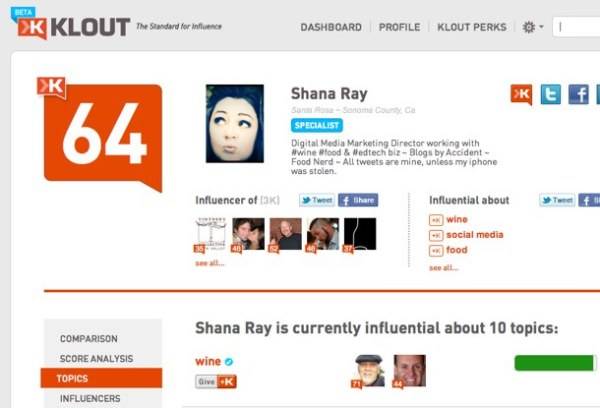There are hundreds of millions of people on Facebook and Twitter and a lot of people want to know who is more or less influential than others online regarding various topics. Klout is one of the best-known startups in this market (PeerIndex is another) and this week Klout has added a new feature: personal endorsements of people on topics they’re influential on.

Called +K, the feature is an easy way to say, with a click, that a person has influenced you on something. I just endorsed RedBull’s Andrew Nystrom on the topic of Social Media on Klout, because I value his opinion on the topic. Is this a good idea? Not everyone thinks it is.
Users of the new feature are allowed to allocate up to 5 +K points each day. The higher your personal Klout score is, the more impact your endorsements will have on the scores of others.
Klout scores are the result of an extensive algorithm measuring your influence on other people online. (E.g. how likely are your Tweets to be ReTweeted?) What are these scores good for? They are interesting to see when evaluating social media users you don’t know yet – and a growing list of companies and organizations now offer special deals to social media users with high Klout scores. I, for example, have been invited to go watch the movie Kung-Fu Panda for free and to attend a talk by the World Wildlife Fund’s chief scientist, Dr. Eric Dinerstein. Dr. Dinerstein, it seems, has no time for losers with too little influence on the Twitter. (Though I can’t find that he has any Klout score himself at all!)
Klout’s been criticized, too, for quantifying human social interactions and turning a new world of egalitarian social media and democratized self-publishing into a hierarchal meritocracy. To that criticism, Klout’s advocates say that measuring of such hierarchy is inevitable because of the demand for it. (Plus, what have you got against free Kung-Fu Panda??)
Adding +K to the Mix
Now there’s +K personal endorsements. Is it a recipe for pandering and groveling? Or a smart way to support the people who have impacted your life and work in important ways? It might be both.

Above: Big influencer Ken Waggoner believes that Shana Ray is particularly influential on the topic of Wine. Co-incidentally, Ray has also endorsed Waggoner on the topic of Wine. No data is available concerning how much expertise either thinks the other possesses on the topic of Wine Expert Identification.
Boston social media strategist Nathaniel Boyle said tonight on Twitter that he thinks the feature “will…reinforce those on top. [B]ut fair is fair.” Marketer John Refford says he’s “not in favor; seems wrong on many levels.”
Almost all the people who posted comments on the Klout blog post about the feature, though, were very, very positive.
I don’t want to like Klout, but I don’t want to ignore it either.
What do you think?
Myself, I use a browser plug-in that shows me every Twitter user’s Klout score next to their username around the web – but I’m still a little skeptical of it. I don’t want to like Klout, but I don’t want to ignore it either. Sometimes I find it useful. I’ve canceled social engagements with some friends when their Klout scores dropped. It had to be done, I’ve got a career to think of.
Just kidding.
The new +K feature doesn’t seem nearly as anti-social as the fundamental quantification of people’s relative worth that Klout is based on. This is a company whose “Dashboard” page is really just a checklist of ways to promote Klout itself around the web. Lots of things about Klout are icky.
However, if someone I know has endorsed someone I know less well on a particular topic – that’s going to mean something to me. I actually like that better than putting a number of their expertise. I feel like I can trust it more. Sure, there’s personal gain to be made in endorsing someone and you can never fully know the web of interests that might motivate an endorsement – but it feels more natural and comprehensible than an algorithm measuring a person.
Maybe that will seem like an antiquated perspective soon. These personal endorsements certainly aren’t gaining anywhere near the traction that automated measuring of people done without requiring them to actively participate has for Klout. There aren’t very many +K endorsements on the profiles I’m finding around the site so far.
Klout’s numbers may be the way of the future more than explicit human interactions like this new +K feature. I’d love to hear your opinions about this matter, dear readers. Assuming, of course, that your Klout score is high enough. Who wants to hear the opinions of someone with a low Klout score?










